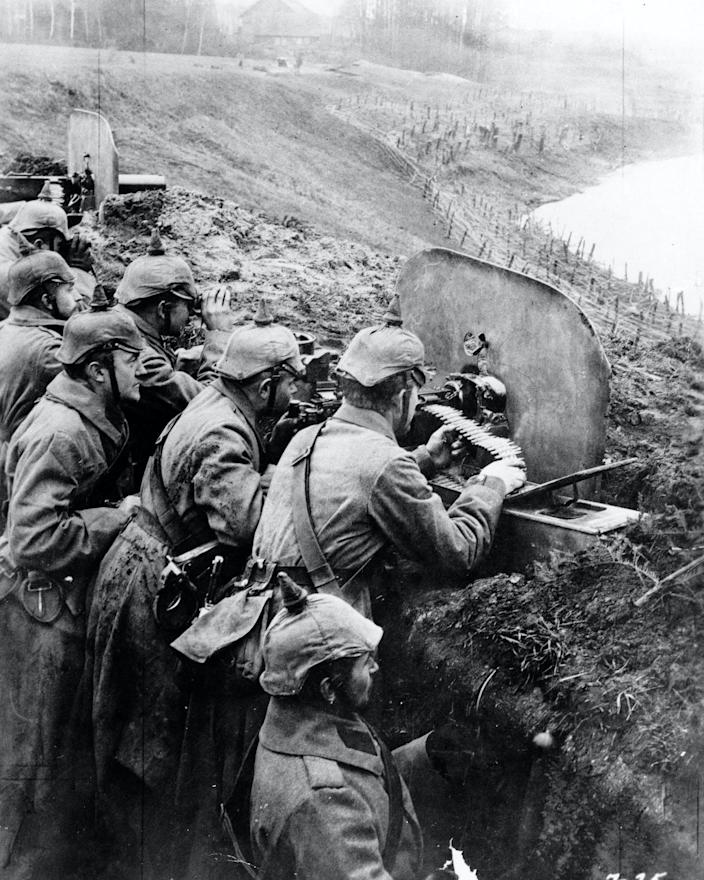
One of the World War I’s most enduring legacies is largely forgotten: It sparked the modern gay rights movement.
Gay soldiers who survived the bloodletting returned home convinced their governments owed them something – full citizenship. Especially in Germany, where gay rights already had a tenuous footing, they formed new organizations to advocate in public for their rights.
Though the movement that called itself “homosexual emancipation” began in the 19th century, my research and that of historian Jason Crouthamel shows that the war turned the 19th-century movement into gay rights as we know it today.
A death in Russia
In the winter of 1915, a German soldier died in a field hospital in Russia. The soldier, whose name is missing from the historical record, had been hit in the lower body by shrapnel when his trench came under bombardment. Four of his comrades risked their lives to carry him to the rear. There, he lay for weeks, wracked by pain in the mangled leg and desperately thirsty. But what troubled him most was loneliness. He sent letters to his boyfriend whenever he could manage it.
“I crave a decent mouthful of fresh water, of which there isn’t any here,” he wrote in his final letter. “There is absolutely nothing to read; please, do send newspapers. But above all, write very soon.”
This soldier, who had to keep his relationship hidden from those around him, was just one of the approximately two million German men killed in World War I. His suffering is not unlike what many others experienced. What his loved ones made of that suffering, however, was different, and had enormous consequences.
His boyfriend, identified in surviving documents only as “S.,” watched the man he loved go off to serve in a war that he did not fully endorse, only to die alone and in pain as S. sat helplessly by hundreds of miles away. S. told their story in a letter to the Scientific Humanitarian Committee, which published it in April 1916.
The Scientific Humanitarian Committee was then the world’s leading homosexual emancipation group, boasting a membership of about 100 people. The soldier’s story took a cruel twist at its very end: S.‘s loving replies were lost in the chaos of the war and never reached the soldier.
“He died without any contact from me,” S. wrote.
Demanding the rights of citizens
After the war, many believed the slaughter had been for nothing. But S. saw a lesson in his partner’s suffering and death.
“He has lost his bright life … for the Fatherland,” wrote S. That Fatherland had a law on the books that banned sex between men. But the sodomy law was just the tip of the iceberg: S. and men like him generally could not reveal their love relationships in public, or even to family members. Homosexuality meant the loss of one’s job, social ostracism, the risk of blackmail and perhaps criminal prosecution.
S. called it “deplorable” that “good citizens,” soldiers willing to die for their country, had to endure the status of “pariahs.” “People who are by nature orientated toward the same sex … do their duty,” he wrote. “It is finally time that the state treated them like they treat the state.”
A new phase of gay rights
Many veterans agreed with S. When the war ended, they took action. They formed new, larger groups, including one called the League for Human Rights that drew 100,000 members.
In addition, as I argue in my book, the rhetoric of gay rights changed. The prewar movement had focused on using science to prove that homosexuality was natural. But people like S., people who had made tremendous sacrifices in the name of citizenship, now insisted that their government had an obligation to them regardless of what biology might say about their sexuality.
They left science behind. They went directly to a set of demands that characterizes gay rights to this day – that gay people are upstanding citizens and deserve to have their rights respected. “The state must recognize the full citizenship rights of inverts,” or homosexuals, an activist wrote in the year after the war. He demanded not just the repeal of the sodomy law, but the opening of government jobs to known homosexuals – a radical idea at the time, and one that would remain far out of reach for many decades.
Respectable citizens
Ideas of citizenship led activists to emphasize what historians call “respectability.” Respectability consisted of one’s prestige as a correctly behaving, middle-class person, in contrast to supposedly disreputable people such as prostitutes. Throughout the 20th century, gay rights groups struggled for the right to serve openly in the military, a hallmark of respectability. With some exceptions, they shied away from radical calls to utterly remake society’s rules about sex and gender. They instead emphasized what good citizens they were.
In 1929, a speaker for the League for Human Rights told an audience at a dance hall, “we do not ask for equal rights, we demand equal rights!” It was, ironically, the ghastly violence and horrible human toll of the World War I that first inspired such assertive calls, calls that characterized gay rights movements around the world in the 20th century.
It would take nearly a century for these activists to achieve one of their central goals – the repeal of sodomy laws. Germany enjoyed a 14-year period of democracy after World War I, but the Nazis came to power in 1933 and used the sodomy law to murder thousands of men. A version of the law remained in force until the 1990s. The United States struck down its sodomy laws only in 2003.
This article is republished from The Conversation, a nonprofit news site dedicated to sharing ideas from academic experts.
Read more:
Laurie Marhoefer receives funding from the University of Washington.
